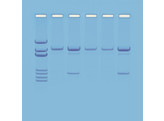For centuries, people have used selective breeding and conventional hybridization to produce desirable traits and increase crop yields. Today, scientists are using genetic engineering to directly manipulate DNA to rapidly produce these desired traits. In this experiment, students will use agarose gel electrophoresis to explore the molecular methods scientists use to identify genetically modified organisms. No thermal cycler is required. Students are also encouraged to explore the controversy surrounding the use of genetically modified organisms.
Enough material for 8 gels
Time required: 60 minutes
Kit includes: Instructions, ready-to-use QuickStrip™ DNA samples, UltraSpec-Agarose™, electrophoresis buffer (50X), 10X loading dye, FlashBlue™ DNA staining, InstaStain® blue cards and disposable pipettes.
Additional Supplies:
DNA electrophoresis, micropipettes: 5-50 µl (optional), white light box and microwave or hot plate.
Storage:
Room temperature stable.
Ready-to-Load QuickStrip™ samples preferably in the refrigerator.
Edvotek Kit No. 121. A link to the most recent online manual is included with the product in the box.
Educational institutions can apply to Bureau GMO for a permit for the use of GMOs in the school
Enough material for 8 gels
Time required: 60 minutes
Kit includes: Instructions, ready-to-use QuickStrip™ DNA samples, UltraSpec-Agarose™, electrophoresis buffer (50X), 10X loading dye, FlashBlue™ DNA staining, InstaStain® blue cards and disposable pipettes.
Additional Supplies:
DNA electrophoresis, micropipettes: 5-50 µl (optional), white light box and microwave or hot plate.
Storage:
Room temperature stable.
Ready-to-Load QuickStrip™ samples preferably in the refrigerator.
Edvotek Kit No. 121. A link to the most recent online manual is included with the product in the box.
Educational institutions can apply to Bureau GMO for a permit for the use of GMOs in the school
Properties
- F778121

